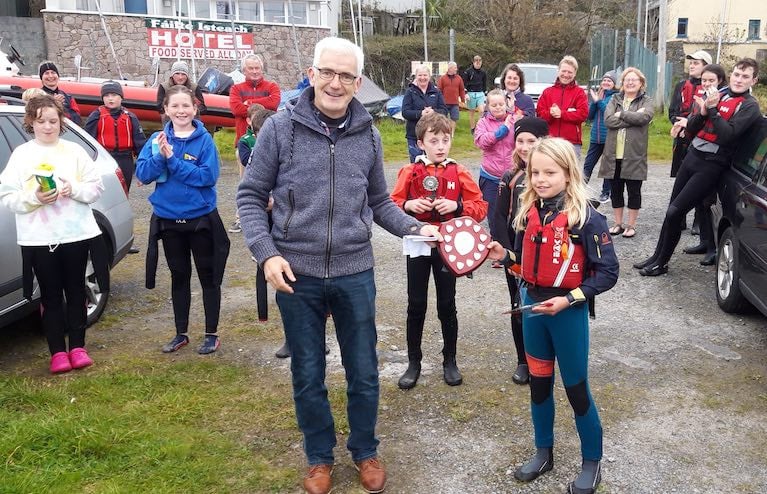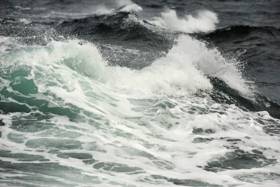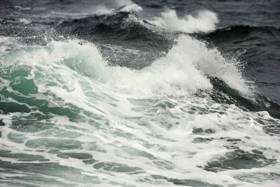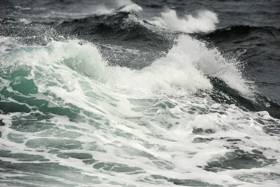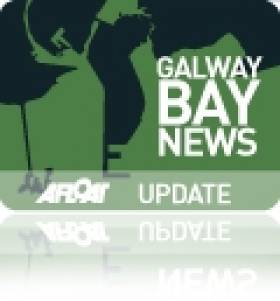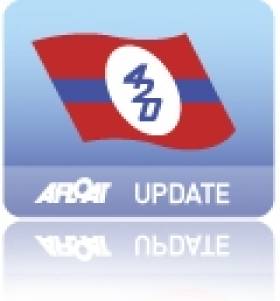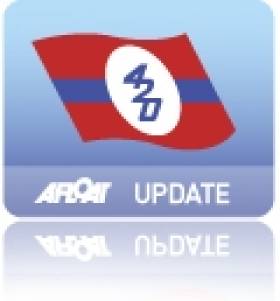Displaying items by tag: Spiddal
Fundraiser for Family of Man Who Died in Galway Bay Kayaking Tragedy Raises More Than €25K
An online fundraiser for the family of a man who died while kayaking in Galway Bay last month has surpassed its €20,000 goal.
As previously reported on Afloat.ie, Mark Morley got into difficulty off Spiddal in Co Galway shortly before 1.30pm on Thursday 29 December, prompting a multi-agency search and rescue effort.
Sadly, the father of two from Doughiska in Galway was pronounced dead at the scene after he was recovered from the water.
According to the Connacht Tribune, friends of the family set up a GoFundMe for Mark’s widow Kate Strochnetter and their daughters Roisin and Allison which has so far raised €25,220 from 468 donations.
“Kate and the girls are well-known in our community for their care and support of others, and this is one way we can help them in their time of grief and need,” the fundraising page says.
Kayaker Who Died in Spiddal Tragedy Named as Father of Two
A man who died while kayaking off the coast of Spiddal in Co Galway on Thursday (29 December) has been named.
Mark Morley, in his 30s, got into difficulty shortly before 1.30pm on Thursday, prompting a multi-agency search and rescue effort.
Sadly, the father of two was pronounced dead at the scene after recovery from the waters of Galway Bay.
An Garda Síochána is preparing a file for the coroner, as Galway Beo reports.
Spiddal Optimist Dinghies Resume Regatta Racing with Keen Contest
In spite of fresh westerly conditions, the Optimist fleet in Spiddal, Co Galway completed its series of races yesterday for last weekend’s club’s annual regatta.
The Optimist class had been unable to begin their first race at the Cumann Seoltóireachta an Spidéil (CSS) regatta on September 19th, due to north-easterly winds which pushed the fleet below the start line.
However, six boats from the Spiddal club turned out on September 27th, with commodore Dave Cahill acting as race officer.
First place went to Sarah Donald, with Rory McHale taking second place and Micheál Breathnach came third.
 The CSS resumed regatta Oppie competitors - from left, Katie Gaynor, Ciara Ní Chonghaíle, Michael Breathnach (3rd), Rory McHale (2nd), Realtiín Boinnard and Sarah Donald (1st) before the results were announced Photo: Bartley Fannin)
The CSS resumed regatta Oppie competitors - from left, Katie Gaynor, Ciara Ní Chonghaíle, Michael Breathnach (3rd), Rory McHale (2nd), Realtiín Boinnard and Sarah Donald (1st) before the results were announced Photo: Bartley Fannin)
 Oppie class second prize winner Rory McHale with CSS commodore Dave Cahill Photo: Bartley Fannin
Oppie class second prize winner Rory McHale with CSS commodore Dave Cahill Photo: Bartley Fannin
Also competing in the close run series of three races were Katie Gaynor, Ciara Ní Chonghaíle and Realtín Boinnard - with Realtín receiving a special award for unl\uckiest competitor, \Katie winning the hardest trier category, and Ciara being awarded for best recovery.
Sarah Donald was also awarded the perpetual trophy for the Optimist fleet, which was presented to the club several years ago by former club commodore Dr Tiernan O’Brien.
As Afloat previously reported, the annual CSS regatta on September 19th marked the presentation of the inaugural John and Stephanie Hannan Award, in tribute to the late circuit court judge, sea kayaker and CSS member John Hannan who died earlier this year.
His wife Stephanie Adams has been junior organiser at CSS for a number of years, and their son Marcus is an active sailor and won third prize in the mixed fleet class at the regatta.
The new award – a dinghy on bog oak made by Spiddal-based glass artist Sue Donnellan was presented by Stephanie Hannan to Mark and Denise De Faoite, who were fastest adult sailors in the 420 fleet.
Winners of the 420 class at the CSS regatta were Ciaran Reaney and Cathal Conneely, with Mac O’Brien and Eoin Cahill taking second place.
Sadhbh Laila Riggott and Catherine Harvey took first in the mixed fleet, sailing a Laser Pico, with Alanna Ní Thuairisg and Kate Ní Chonghaíle taking second place in a Topaz Uno.
Foreshore Lease Approved For Galway Bay Marine Energy Test Site
#GalwayBay - In a major boost for the marine energy sector, the Government has approved a 35-year foreshore lease for an upgraded test site in Galway Bay off Spiddal.
Galway Bay FM reports on yesterday’s (Tuesday 19 December) announcement that paves the way for a quarter-scale renewable energy testing facility for wind and wave devices to be established on the site, which has been used to test new technology since 2006 and which is expected to further the aims of the Harnessing Our Ocean Wealth Strategy.
In a nod to local concerns over the project — which received more than 500 submissions in a public consultation last year — the site will be restricted to hosting a single floating wind energy device at ant given time, among other conditions.
Galway Bay FM has more on the story HERE.
Marine Notice: Spiddal Wave Energy Test Site Decommissioning Works
#MarineNotice - The latest Marine Notice from the Department of Transport, Tourism and Sport (DTTAS) advises of the decommissioning of the wave energy test site in Galway Bay.
The decommissioning of the Marine Institute's wave energy site will involve the removal of four cardinal marks and a wave monitoring data buoy, and the establishment of a new special mark denoting the presence of the Galway Bay Subsea Observatory on the seabed at the site off Spiddal.
The Chateau Thierry (Callsign EIHK6) was scheduled to arrive in Galway Bay this week between Monday 11 and next Monday 18 September. This operation is expected to last two days, depending upon weather or other operational conditions.
It is anticipated that the decommissioning operation will be completed on or before Tuesday 19 September.
The Chateau Thierry will display appropriate lights and markers. The work vessel will be broadcasting and listening on VHF Channel 16 during the decommissioning.
Full details of co-ordinated of the relevant work areas are included in Marine Notice No 38 of 2017, a PDF of which is available to read or download HERE.
Spiddal Marine Energy Test Site Plans Attract More Than 500 Submissions
#GalwayBay - More than 500 submissions were lodged during last year’s public consultation on proposals to upgrade the marine energy test site in Galway Bay off Spiddal.
And according to the Connacht Tribune, many voiced serious concerns over the project’s potential impact on Galway Bay.
As previously reported on Afloat.ie, the Marine Institute had applied to the Department of the Environment, Community and Local Government for a foreshore lease for the site where prototype marine and renewable energy technology would be tested at reduced scale.
The consultation period, which closed on 17 June last, was accompanied by a public information evening on the project and its ambitions.
However, the Connacht Tribune reports that the response from local businesses and communities has been largely negative.
One fisherman expressed his fear that the lease area could be expanded into prawn grounds already reduced by the original lease for the site a decade ago.
Other concerns include the 35-year period of the lease, the scope and veracity of information provided, and the lack of an Environmental Impact Statement, as well as the impact on tourism on the Wild Atlantic Way in South Connemara.
The Connacht Tribune has more on the story HERE.
Row Over Spiddal Pier Storm Works
#Spiddal - Storm damage works at Spiddal Pier on Galway Bay have been branded "environmental vandalism" by locals, as The Irish Times reports.
Following a community request to Galway City Council after the series of storms that slammed the Atlantic coast a year ago, remedial works were undertaken at the 'Nimmo's pier' at An tSeancéibh, not far from where the remains of an ancient 'drowned' forest were uncovered.
But these works – which involved an extension of the original pier designed by Alexander Nimmo as well as significant dredging in the harbour – have been described as "unsightly" and even "hazardous" for small craft.
That's according to local activist Seán Ó Coistealbha, who also says an important lugworm bed was "destroyed" by the dredging with no prior consultation.
However, the council claims its works were necessary to repair "very extensive" damage at the pier head "and make it safe for tSeancéibh users and the general public".
The Irish Times has much more on the story HERE.
#420 - Howth Yacht Club's Robert Dickson and Sean Waddilove remain dominant in the 420 class nationally following their convincing first-place performance at the 420 Connachts last weekend.
It was a double podium finish for the North Co Dublin club, too, as Ewan McMahon and Colin O'Sullivan placed third out of the 16 entries that raced in "perfect sailing weather" off Spiddal in Galway Bay.
Howth Yacht Club has more on the story HERE.
Cork Girls take 420 Dinghy Leinster Title
The National Yacht Club hosted the 420 dinghy Leinster Sailing Championships over the Easter Weekend, attracting twelve boats and visiting crews travelling from Crosshaven, Kinsale, Malahide, Spiddal, Tralee and Wexford.
Emma Geary and Niamh Connolly from Royal Cork YC counted four wins and a second place in the six-race series to win the event convincingly. The girls will be aiming to repeat their success next weekend at the ISA Mitsubishi Youth Nationals in Dun Laoghaire in order to secure a nomination to the 2011 ISAF Youth Worlds, which will be held in Croatia.
Fiona and Patrick Daly of Tralee Bay SC finished second overall with a very consistent four 2nds and two 3rds Aodh Kennedy/Daniel Browne (Kinsale YC) who were third overall and Richard D’Esterre/Peter Stokes (CYS/Royal Munster) also recorded race wins.
Alanna Lyttle and Cian Guifoyle (Royal St.George YC) narrowly defeated fellow newcomers Emily Jones and Liadh Conway (Wexford Harbour BC) for the Silver Fleet Trophy.
PRO Larry Power and his mark laying teams provided excellent racing in sometimes challenging wind conditions while Sandra Moore ran the race office throughout the weekend.
Full results available here.
Spiddal Open Day this Sunday
The club is recognised by the ISA, and runs ISA-approved youth training courses for its members every year, ranging from an introduction to sailing to more advanced techniques. Its course programme this year runs from 28 June to 9 July.
Weather permitting, there will be opportunities to try your hand at crewing or helming in Spiddal harbour from 2.30pm to 4.30pm.


























